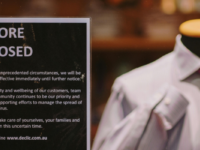Sharing economy leaders tell us why this market segment shows no sign of slowing down.
The disruptive impact of the sharing economy is clear. Not only has it revolutionised a large number of sectors, it has brought with it a seismic shift in business and consumer behaviour.
Projections by PWCs show that the sharing sector’s global revenues have the potential to increase to around $335 billion by 2025 – it’s an economy showing no signs of slowing down.
No industry is safe from its disruption with more peer-to-peer marketplaces emerging to challenge stale industries, with many believing that the sharing economy will soon be completely ubiquitous.
We have spoken to some of Australia’s top sharing leaders to gather insight into why it’s time to start caring about sharing in 2017.
Steve Orenstein, founder and CEO Zoom2u, the on-demand courier service that enables businesses and individuals to book express, same day or overnight delivery services:
“In the past year in Australia and internationally, we have seen almost every traditional market being disrupted by new entrants who are developing marketplaces which allow people to share a service or product. Australia is catching up and many markets which have already been disrupted in the US and Europe are now being disrupted here.”
“In 2017, I think we will see some consolidation from 2016. Many marketplaces which started, may not have raised enough capital or gained enough traction to survive. Consolidation will start to take place with one to two businesses leading the disruption in each industry. Being number one will be key to success and there will be a significant difference between coming first or second.”
Will Davies, CEO, CarNextDoor, a peer-to-peer car sharing and rental service:
“Over the past year, we have seen the sharing economy moving squarely into the mainstream. For example, when Airbnb first tried to raise capital with the idea for people sharing their homes with strangers, they were laughed out of boardrooms. This year we’ve seen billboards at the airports with Airbnb partnering with Qantas, one of Australia’s oldest and most trusted brands. There is greater acceptance and trust.”
“A huge range of sharing economy platforms have grown up over the past few years, and this past year has seen exponential growth and diversity. You can share time, meals, skills, space, handbags, pets and of course cars – plus many more ideas that are coming up all the time to make better use of all the under-used resources in our community.”
“For sharing economy businesses in the transport area, the shift to driverless cars is going to completely transform the landscape. This year ahead will see massive development in this space.”
Mike Rosenbaum, co-founder and CEO of Spacer.com.au, an Australian online peer-to-peer marketplace for self-storage:
“The last 12 months has seen even broader popular acceptance of global brands Uber, Airbnb and Etsy fuel the proliferation of new vertical sharing economy platforms. Today, it appears there is an Uber of something for almost every asset class.”
“New marketplaces will continue to mushroom locally, either as original concepts or copycats from abroad, however, we will also see the natural churn of some of the early marketplace concepts, which either failed to generate scale or have been usurped by changing technology.”
Mr Alexis Soulopoulos, CEO and co founder of Australia’s pet sitting network, Mad Paws
“Mad Paws has noticed an increase in suppliers listing their services on several sharing economy platforms to turn themselves into mini-entrepreneurs. This is the positive outcome of the sharing economy offering a solution to workers’ increasing desire for flexibility and freelancing.”
“Looking at the year ahead, government involvement in the sector will continue to increase as the industry grows and they look to manage tax, labour and consumer protection obligations in a rapidly changing work environment.”
Inside Small Business















